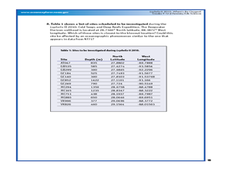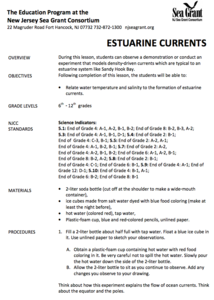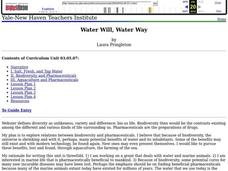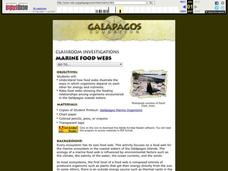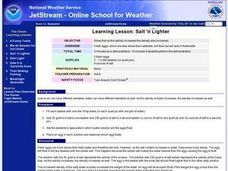Curated OER
Exploring the Aral and Salton Seas
Learners investigate the environments of the Aral and Salton Seas. They use images taken from the space shuttle, the U2 spy planes, and remote sensing satellites to learn more about what is happening in each region. Students discuss the...
Curated OER
Hot, Cold, Fresh and Salty
Students observe the effects of layering water and what is more or less saline than normal. In this geoscience lesson students create saline solutions, layer them and observe how the water becomes different temperatures in different layers.
Curated OER
Where's the Oxygen?
Young scholars study seawater and how temperature and salinity influence it. In this oxygen lesson students complete a lab activity on dissolved oxygen.
Curated OER
Coral Bleaching
Students examine the relationship between corals and zooxanthellae, identify stresses to corals, and explain coral bleaching. In this sea life lesson students predict the effects of increased temperatures on coral reefs.
Curated OER
Estuarine Currents
Students experiment observing a demonstration on models of density-driven currents which are typically found in an estuarine system of water flow. They compare/contrast water temperature and salinity to the formations of estuarine currents.
Curated OER
Rocky Intertidal Field Trip
Learners investigate tides and the land submerged under them. In this intertidal field trip, Students visit the intertidal zone and observe the habitats and animals that live there. Learners view the pools under rocks where lobsters...
Curated OER
What is an Estuary?
Young scholars define the terms estuary and watershed. They conduct an experiment to determine the density differences between fresh and saltwater. They examine the salinity distribution of the Peconic Bay Estuary.
Curated OER
The Caspian Sea
In this comprehension and geography worksheet, students read an article about the Caspian Sea, identifying where it is located and what countries surround it. Then they describe three parts of the sea, what are tributaries, and how many...
Curated OER
Water Will, Water Way
Students test tap water for hardness and mineral content. In this environmental science lesson, students identify the different stages of the water cycle. They classify plant and animals according to the rules of taxonomy.
Curated OER
The Effects of Storms
An excellent way to review a chapter or unit on storms, this worksheet features vocabulary review (gust, evacuation, storm surge, salinity), concept review (effects and details about hurricanes), skills/process review (normal high tide...
Curated OER
The Future of Arctic Sea Ice
High schoolers research about the importance of sea ice to world climate and sea organisms. In this earth science lesson, students create a model of present and future Arctic sea ice communities. They discuss how ice melting affects...
Curated OER
Water Currents
Students demonstrate how ocean currents are influenced by changes in density. They discover that temperature and salintiy affect density as well. They participate in a short experiment to end the lesson.
Curated OER
Sea Secrets
Young scholars study the following: For centuries, people have been challenged by the mysteries that lie beneath the blue depths of our ocean planet. Very little was known about the ocean until late in the nineteenth century, although...
Curated OER
Currents: Bad for Divers; Good for Corals
Students describe, compare, and contrast major forces that drive ocean currents. They discuss the general effects of topography on current velocity. They discuss how velocity affects the ability
Curated OER
Investigation of the Aral and Salton Seas
Students become more environmentally conscious. They see that it may be too late to "save" the Aral Sea, but there is still hope to prevent the ecological collapse of the Salton Sea.
Curated OER
Sea Connections: Marine Ecosystems
Students identify producers and consumers from marine ecosystems and describe the balance among them in the environments. After constructing a food chain from a marine ecosystem, they examine human activities that can upset the balance...
Curated OER
Marine Food Webs
Students examine how food webs illustrate the ways in which organisms depend on each other for energy and nutrients, and make food webs showing the feeding relationships among organisms encountered in the Gal??pagos coastal waters.
Curated OER
Telemetry
In this telemetry activity, students will read about how telemetry works and the different ways that scientist use telemetry to gather data. Students complete 2 short answer questions based on the reading.
Curated OER
Learning Lesson: Salt 'n Lighter
Learners participate in a demonstration showing that as salinity increases density increases as well. They also examine the different densities of air. They discuss the amount of water displaced by large ships.
Curated OER
Current Interactions
Students design an experiment to see how wind, temperature, and salinity work together to influence ocean currents and present it in a report format. They explain to their classmates how experiment findings relate to ocean currents.
Curated OER
Liquid Rainbow
Learners develop their own techniques for drawing a small sample of solutions into a straw. They hypothesize ways to increase the density of water, and discuss how salt-free rainwater tends to float on top of salty seawater.
Curated OER
Estuarine Currents
Students explore an estuarine system to gather data on density driven currents. This type of current is contrasted with temperature and wind driven currents.
Curated OER
Properties of Fresh and Sea Water
Students work with three stations to demonstrate the properties of water. They explore water's boiling point, freezing point, and its ability to store heat.
NASA
Freshwater Availability Classroom Activity
This science assignment produced by NASA teaches inquiring minds the distribution of Earth's water. Learners will appreciate and understand the importance of fresh water and how weather and climate affects everything.




